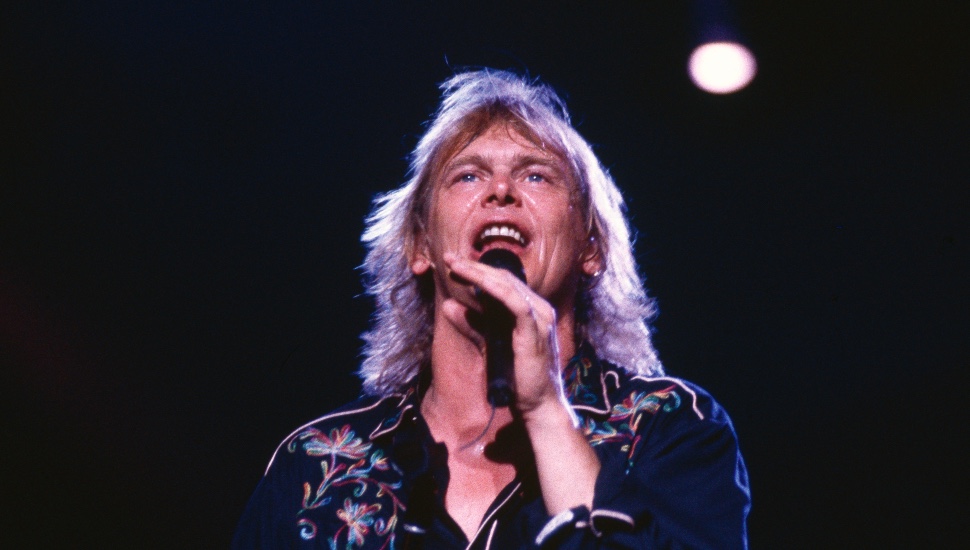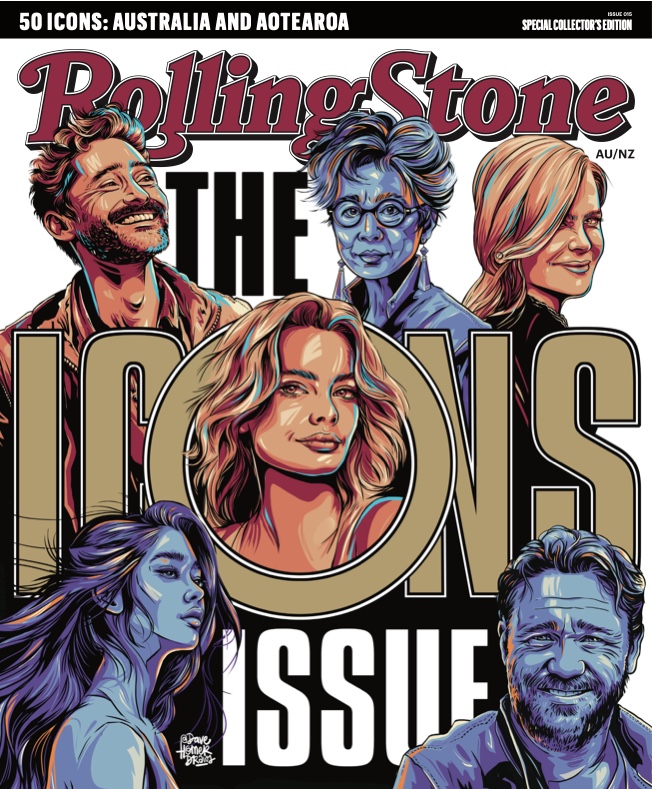Last week, Rolling Stone AU/NZ revealed its next annual special collector’s edition, celebrating 50 of the most iconic stars from across Australia and Aotearoa. The magazine’s December-February ‘Icons Issue’, which is on newsstands and at Coles now, looked at...

Last week, Rolling Stone AU/NZ revealed its next annual special collector’s edition, celebrating 50 of the most iconic stars from across Australia and Aotearoa.
The magazine’s December-February ‘Icons Issue’, which is on newsstands and at Coles now, looked at 50 living Icons across screen (TV and film), music and comedy, those who have broken boundaries, shattered ceilings and opened doors.
These 50 living Icons are etched into the cultural history books — here and abroad — and continue to inspire the next generation of Icons.
You can check out the full list of Icons here. Read our essay on one Icon, legendary Aussie singer John Farnham, below.
Thousands of people are screaming. In despair. In desperation. In protest. But also in joy. In harmony. In hope.
It’s Sunday, February 16th 2020, and Australia’s year has got off to an appalling start. It was, it turns out, to be a downward trajectory that would continue for weeks, months and years, with more natural disasters, a pandemic, lockdowns, economic uncertainty, and a country divided by policy, politics and a holidaying Prime Minister. But we didn’t know that yet.
On this day in February 2020 at the Fire Fight Concert for National Bushfire Relief in Australia, the devastating, seemingly never-ending bushfires are front of mind, and it seems unimaginable that something worse than this could be just around the corner.

The 75,000-odd crowd do not know the fires, the floods and the furore that is to come. They do not know COVID-19 will change the course of history. Or that this will be one of the final massive gigs in Australia before the country is plunged into lockdown after lockdown. (Indeed, just twenty-eight days later, New South Wales cancelled all events with more than 500 people and only four days after that international borders were closed).
What they do know is this: The music and arts are often one of the first industries to activate and act when disaster strikes. They pull out all the stops. Donate. Perform for free. Bring people together. Celebrate and commiserate.
They also know the power of John Farnham, as one of our greatest and most enduring live performers. And on this day in 2020, John did what he does best — sing his guts out and inspire people to get on their feet and do something.
He is the closing act of the relief gig, and follows acts including Queen and Adam Lambert, k.d. lang, Delta Goodrem, Grinspoon, Alice Cooper, Amy Shark and Baker Boy.
He performs “Age of Reason”, “Pressure Down”, “Two Strong Hearts”, “That’s Freedom”, and, of course, the powerful (and political) “You’re the Voice”, alongside Indigenous performer Mitch Tambo.
It is a unifying and uplifting moment as tens of thousands of people collectively declare they aren’t going to sit in silence, and they certainly aren’t going to live in fear.
Such is the power of the icon that is John Farnham.
In 2020, he can bring an unwell Olivia Newton-John out of a hiatus and onto the stage. He can, after decades in the business, still command the crowd and be the closing act for a bill already steeped with talent both old and new. He can, thirty-three-odd years after its release, still inspire a crowd with the iconic anthem “You’re the Voice”.

Now, just three and a half years later, almost everything has changed — except his icon status.
Olivia Newton-John, his long-time collaborator and friend, passed away on Monday, August 8th 2022. Her duet with Farnham on stage at Fire Fight in 2020 was her last performance. Another constant in his life, talent manager, entrepreneur and friend, Glenn Wheatley also died in February 2022. That same year, John was diagnosed with throat cancer. He underwent a twelve-hour operation to remove a tumour from his mouth, with part of his jaw also being removed.
It was, to put it lightly, a terrible year for a man who has brought such joy and inspiration to so many.
Now in late 2023, John’s in the headlines for two reasons — one is people seeking constant updates about his health and wellbeing. Will we see or hear from him again? Will he take to the stage? What did he think of the record-breaking documentary John Farnham: Finding the Voice?
The other headline-grabbing John moment in 2023 has been the use of his iconic song in a last-minute push for the YES vote in the (now defeated) Voice to Parliament referendum. Some people who didn’t support the ‘Yes’ movement felt betrayed. Here is a song they knew, they loved, they had connected their own meaning to, being used for something they personally did not endorse. “You’re the Voice” became a political football, a topic of morning TV debate, and in some cases, a reason people felt betrayed, while others felt inspired.
The Uluru Dialogue co-chair, and one of the architects of The Voice, Professor Megan Davis, said prior to the referendum that “You’re the Voice” is the nation’s unofficial anthem.
“I was in primary school when it was released and, as a young girl, instantaneously felt the power of its message about agency and walking together,” she said.

Tim Wheatley, son of the late Glenn, also noted the power of the song.
“‘You’re the Voice’ is not aligned with any political party. It is aligned with humanity. It’s a song for all Australians. Always has been, always will be,” he said.
“Win or lose this referendum, this song will forever remain on the right side of history.”
Such is the power and passion an icon such as John can ignite. People want him fully recovered so they can hear him belt out his agenda-setting, game-changing power ballad — but people across the political and social spectrum also feel they own and understand the song’s meaning.
His sons though are more focused on the positive — the success of the Finding the Voice documentary, and discovering the extent of the impact their dad has had.
“I’ve just enjoyed seeing how many people love dad. That blows my mind, and it’s just not an older generation. It’s every single generation and it still trips me out,” Robert and James say of the film’s success.
“Dad’s a very real person in general. So, for him, having someone approach him to do a movie about himself is probably his worst nightmare. He doesn’t see the big deal in himself. But it is nice to see the doco representing that as well and being as true as can be,” Robert reveals.
They won’t speak for him, or reveal his future, but they do insist he’s back to normal and he can still sing — which will be a relief to his fans.
One such fan is global superstar Celine Dion.
“I was there when [dad] met Celine, and that was one of the coolest things I’d ever seen,” son James recalls. “We were in Canada and we were getting on a plane to go somewhere and, literally, Celine Dion ran across the airport screaming ‘John!’ This is the first time that they’d met, and she’s sprinting across the airport with her husband, and she fangirled over our dad.”
Another is Chris Martin from Coldplay, who met John when he was (once again) giving his time over to a bushfire relief concert — in this instance, 2009’s Sound Relief.
Chris says John is always generous with both his time and his voice.
“For the concert in Sydney he really came and gave us the best moment. It was so fun to be his backing band, and he and the song [“You’re the Voice”] felt big and resonant enough for the occasion in a way that perhaps we didn’t. Off stage he was extremely sweet and I just felt so grateful for him,” Chris tells Rolling Stone AU/NZ.

Mega Australian export and fellow icon Keith Urban says there’s just something different about John.
“With that celestial gift of a voice he was born with, he sings from a very human place,” Keith tells Rolling Stone AU/NZ. “That may sound obvious to some people, but there are some singers with equally extraordinary voices, but you just don’t feel them the way you do with John.”
Keith cites songs including “Playing to Win”, his cover of “Help”, “Age of Reason” and “Please Don’t Ask Me” as among his favourites, but says the emotion and phrasing of “Burn For You” gets that particular track across the line into the number one spot for him.
Any time he can see John perform live though, is a good time.
“I feel that John has always been a phenomenal example of constantly reaching to make great music, work with great people, and bring that spirit of hope, levity, humour and passion to not only his records, but to audiences every single time he hits a stage,” he says.
Plus, Keith says, there’s just something so “Aussie” about “Our John” (even though, yes, he was born in Essex, England).
“For me, one of the enduring attributes of Aussies in general, is our tenacity, our determination and resilience. When you look at John’s career — man, do you sure see that in spades spanning decades,” he says.
“[Aussies love him] because he’s so Aussie. It’s a lifestyle, an attitude, a way of being with your priorities, your family, your friendships. I love him.”
Words: Vivienne Kelly
This John Farnham Icons essay features in the December-February ‘Icons Issue’ of Rolling Stone AU/NZ. If you’re eager to get your hands on it, then now is the time to sign up for a subscription.
Whether you’re a fan of music, you’re a supporter of the local music scene, or you enjoy the thrill of print and long form journalism, then Rolling Stone Australia is exactly what you need. Click the link below for more information regarding a magazine subscription.
SUBSCRIBE HERE


